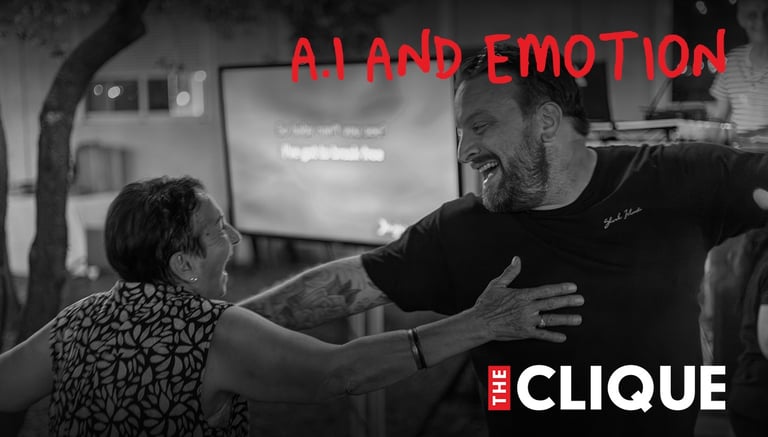A.I & Emotion


I’ve been struggling to come up with the ideal analogy to describe my thoughts on A.I and whether or not it will be a major player in the content space but I think I’ve found it..
54 years ago - long before the invention of A.I, there was a seminal moment in pop & music culture;
Woodstock Music and Art Fair, commonly referred to as Woodstock, was a music festival held during August 15–18, 1969. It is widely considered to be a defining moment in pop culture.
If you were one of the millions of people who have just watched Elton John’s closing performance at Glastonbury - you saw the size of the crowd that Sunday night. He closed his final performance in the UK playing to an estimated 120,000 people at Worthy Farm.
That’s an insane amount of people.
But 54 years ago, Jimi Hendrix closed the first Woodstock festival and played to an estimated 450,000.
450,000 people. 😲
This was before the hype of social media, before the days of the red button so you could see any act you wanted to see play - it was a movement which was seismic in it’s inception and cultural importance.
So much so that it’s been forever copied and celebrated in the years that followed.
The problem with trying to recreate the original festival was that it was a unique event - nothing could possibly replicate the factors which contributed to the festival being a success - the counterculture phenomenon which rose up during the 60’s in the wake of the Vietnam War being the primary factor in the success of the festival.
The culture and political climate would never be the same, so how could the festival ever have the same ‘feeling’.
Look at the 50th anniversary of Woodstock which was ‘held’ in 1999 - (if you’ve never seen the Netflix special ‘Trainwreck’ then you should check it out) - it was literally a train wreck as the festival organisers failed to understand what had made the first festival so special - the emotion behind the festival, the general sense of importance around the ‘moment’.
This is the problem with A.I.
Someone once told me (it was Paul Tansey on the SalesChange podcast) that ‘Much Innovation is actually Re-Combination’ - which is exactly what A.I does.
There is nothing original and it does not understand culture nor emotion (my wife tells me that this is much like a man.)
A.I cannot judge a political environment and sense the best location, best ambience or the best performers to create a unique environment which will forever be defined as an important moment.
Sure, it could recreate something similar - it could handpick artists based on their chart position but that’s not how music works.
Taste is subjective - A.I isn’t.
Sure,
I’ve tried to use A.I to write scripts - it doesn’t work, there is zero emotion.
I’ve tried to use A.I to write newsletters - it doesn’t work, there is zero personality.
I’ve also tried to use A.I to come up with vlog ideas - it doesn’t work, there is no spontaneity.
You see, none of these attempts at a shortcut to ‘create’ yielded any results close to anything resembling something that I would publish - I like the way I talk, the way I write and the way I edit my videos - having A.I try to capture the feeling around how I type would feel weird.
Recently at the You are the Media lunch club (the one where I tried to break the world record for the most amount of Ferrero Rocher’s in one minute) I was sat chatting with Liam Toms and he and I discussed this topic - he came up with the excellent analogy of Oasis.
Liam and Noel - born separately, influenced in different ways and then thrown together into a band - they again captured a moment and formed the bedrock of the 90’s britpop movement. Throw into that mix the faux ‘war’ with Blur in the charts and you have a unique pop culture moment.
Now try and recreate that moment with A.I.
It’s impossible as it’s the spontaneous moments which cannot be recreated.
My examples don’t just limit themselves to human movements either - yes, Woodstock was because of the collective culture and political environment, Oasis was based on external influences which formed a band which was ripe for it's ‘time’.
But what about a building?
Surely A.I could recreate the success of bricks and mortar?
I mean, it’s just the same as any other building? A library is a library, a palace is a palace.
But what about the Cavern Club in Liverpool?
The Cavern Club is again a cultural phenomenon.
Performers flock to play there - The Beatles, The Kinks, The Rolling Stones, Queen, Arctic Monkeys and even Adele. But what makes it special is not the bricks and mortar but the history - the legacy and kudos you get from being there.
I like A.I - don’t get me wrong, I can see the uses of the technology but I am becoming more and more aware of it’s limitations


